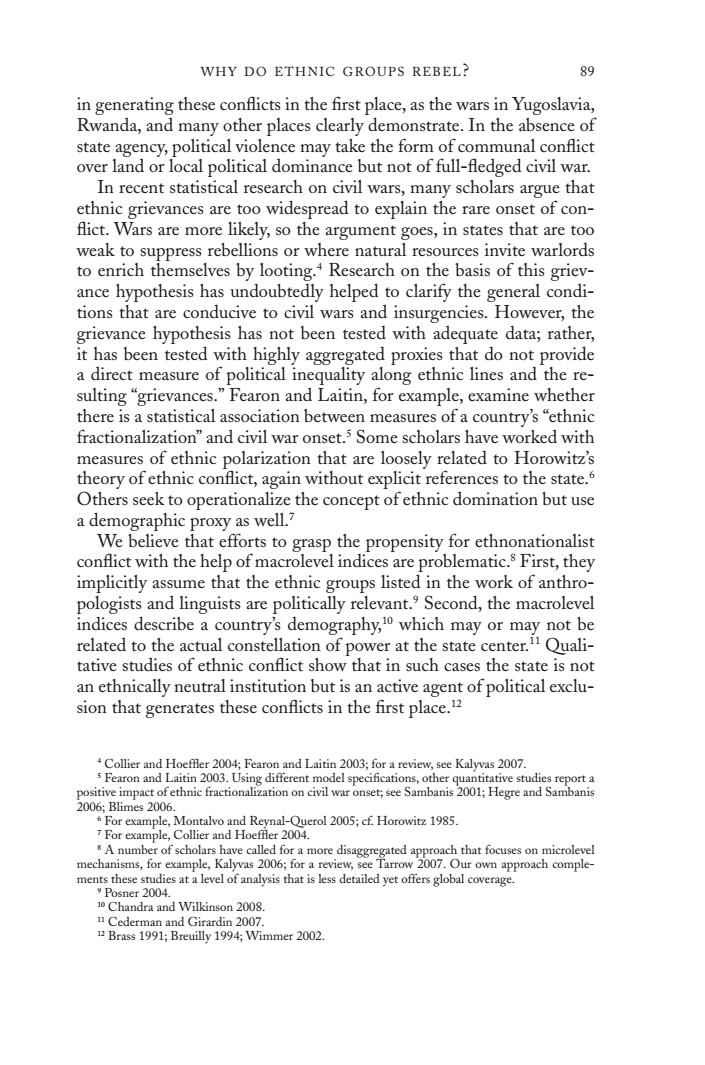正在加载图片...

WHY DO ETHNIC GROUPS REBEL? 89 in generating these conflicts in the first place,as the wars in Yugoslavia, Rwanda,and many other places clearly demonstrate.In the absence of state agency,political violence may take the form of communal conflict over land or local political dominance but not of full-fledged civil war. In recent statistical research on civil wars,many scholars argue that ethnic grievances are too widespread to explain the rare onset of con- flict.Wars are more likely,so the argument goes,in states that are too weak to suppress rebellions or where natural resources invite warlords to enrich themselves by looting.Research on the basis of this griev- ance hypothesis has undoubtedly helped to clarify the general condi- tions that are conducive to civil wars and insurgencies.However,the grievance hypothesis has not been tested with adequate data;rather, it has been tested with highly aggregated proxies that do not provide a direct measure of political inequality along ethnic lines and the re- sulting"grievances."Fearon and Laitin,for example,examine whether there is a statistical association between measures of a country's "ethnic fractionalization"and civil war onset.5 Some scholars have worked with measures of ethnic polarization that are loosely related to Horowitz's theory of ethnic conflict,again without explicit references to the state. Others seek to operationalize the concept of ethnic domination but use a demographic proxy as well.? We believe that efforts to grasp the propensity for ethnonationalist conflict with the help of macrolevel indices are problematic.s First,they implicitly assume that the ethnic groups listed in the work of anthro- pologists and linguists are politically relevant.Second,the macrolevel indices describe a country's demography,10 which may or may not be related to the actual constellation of power at the state center.Quali- tative studies of ethnic conflict show that in such cases the state is not an ethnically neutral institution but is an active agent of political exclu- sion that generates these conflicts in the first place.12 Collier and Hoeffler 2004;Fearon and Laitin 2003;for a review,see Kalyvas 2007. s Fearon and Laitin 2003.Using different model specifications,other quantitative studies report a positive impact ofethnic fractionalization on civil war onset,see Sambanis 2001;Hegre and Sambanis 2006;B1imes2006. s For example,Montalvo and Reynal-Querol 2005;cf.Horowitz 1985. 7 For example,Collier and Hoeffler 2004. A number of scholars have called for a more disaggregated approach that focuses on microlevel mechanisms,for example,Kalyvas 2006;for a review,see Tarrow 2007.Our own approach comple- ments these studies at a level of analysis that is less detailed yet offers global coverage. Posner 2004. 10 Chandra and Wilkinson 2008 Cederman and Girardin 2007. 12 Brass 1991;Breuilly 1994;Wimmer 2002.why do ethnic groups rebel? 89 4 Collier and Hoeffler 2004; Fearon and Laitin 2003; for a review, see Kalyvas 2007. 5 Fearon and Laitin 2003. Using different model specifications, other quantitative studies report a positive impact of ethnic fractionalization on civil war onset; see Sambanis 2001; Hegre and Sambanis 2006; Blimes 2006. 6 For example, Montalvo and Reynal-Querol 2005; cf. Horowitz 1985. 7 For example, Collier and Hoeffler 2004. 8 A number of scholars have called for a more disaggregated approach that focuses on microlevel mechanisms, for example, Kalyvas 2006; for a review, see Tarrow 2007. Our own approach complements these studies at a level of analysis that is less detailed yet offers global coverage. 9 Posner 2004. 10 Chandra and Wilkinson 2008. 11 Cederman and Girardin 2007. 12 Brass 1991; Breuilly 1994; Wimmer 2002. in generating these conflicts in the first place, as the wars in Yugoslavia, Rwanda, and many other places clearly demonstrate. In the absence of state agency, political violence may take the form of communal conflict over land or local political dominance but not of full-fledged civil war. In recent statistical research on civil wars, many scholars argue that ethnic grievances are too widespread to explain the rare onset of conflict. Wars are more likely, so the argument goes, in states that are too weak to suppress rebellions or where natural resources invite warlords to enrich themselves by looting.4 Research on the basis of this grievance hypothesis has undoubtedly helped to clarify the general conditions that are conducive to civil wars and insurgencies. However, the grievance hypothesis has not been tested with adequate data; rather, it has been tested with highly aggregated proxies that do not provide a direct measure of political inequality along ethnic lines and the resulting “grievances.” Fearon and Laitin, for example, examine whether there is a statistical association between measures of a country’s “ethnic fractionalization” and civil war onset.5 Some scholars have worked with measures of ethnic polarization that are loosely related to Horowitz’s theory of ethnic conflict, again without explicit references to the state.6 Others seek to operationalize the concept of ethnic domination but use a demographic proxy as well.7 We believe that efforts to grasp the propensity for ethnonationalist conflict with the help of macrolevel indices are problematic.8 First, they implicitly assume that the ethnic groups listed in the work of anthropologists and linguists are politically relevant.9 Second, the macrolevel indices describe a country’s demography,10 which may or may not be related to the actual constellation of power at the state center.11 Qualitative studies of ethnic conflict show that in such cases the state is not an ethnically neutral institution but is an active agent of political exclusion that generates these conflicts in the first place.12